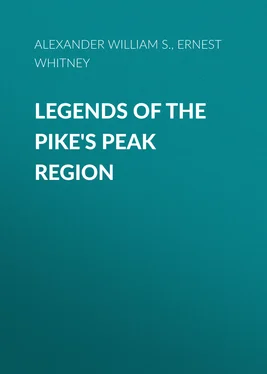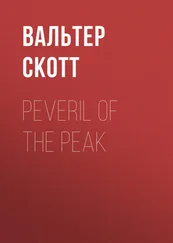William S. Alexander - Legends of the Pike's Peak Region
Здесь есть возможность читать онлайн «William S. Alexander - Legends of the Pike's Peak Region» — ознакомительный отрывок электронной книги совершенно бесплатно, а после прочтения отрывка купить полную версию. В некоторых случаях можно слушать аудио, скачать через торрент в формате fb2 и присутствует краткое содержание. Издательство: Иностранный паблик, Жанр: Путешествия и география, foreign_antique, на английском языке. Описание произведения, (предисловие) а так же отзывы посетителей доступны на портале библиотеки ЛибКат.
- Название:Legends of the Pike's Peak Region
- Автор:
- Издательство:Иностранный паблик
- Жанр:
- Год:неизвестен
- ISBN:нет данных
- Рейтинг книги:5 / 5. Голосов: 1
-
Избранное:Добавить в избранное
- Отзывы:
-
Ваша оценка:
- 100
- 1
- 2
- 3
- 4
- 5
Legends of the Pike's Peak Region: краткое содержание, описание и аннотация
Предлагаем к чтению аннотацию, описание, краткое содержание или предисловие (зависит от того, что написал сам автор книги «Legends of the Pike's Peak Region»). Если вы не нашли необходимую информацию о книге — напишите в комментариях, мы постараемся отыскать её.
Legends of the Pike's Peak Region — читать онлайн ознакомительный отрывок
Ниже представлен текст книги, разбитый по страницам. Система сохранения места последней прочитанной страницы, позволяет с удобством читать онлайн бесплатно книгу «Legends of the Pike's Peak Region», без необходимости каждый раз заново искать на чём Вы остановились. Поставьте закладку, и сможете в любой момент перейти на страницу, на которой закончили чтение.
Интервал:
Закладка:
Ernest Whitney
Legends of the Pike's Peak Region / The Sacred Myths of the Manitou
However uncouth they may be, the myths and legends of early nations, like the poetry of later, give the highest and truest exponents of their characters, and preserve with a singular fidelity the very essence of their daily lives, their fears and hopes, their assumptions and intuitions. It is proverbial that the songs of a people are stronger than their laws; and the myths and traditions embodying the sentiments upon which national character, national religion, are founded, are more powerful than the songs, which they inspire. A ballad of the people, a bit of folk lore, may teach us more than whole chapters of history; we can hardly understand history without such lights.
A century ago Scotland was to England what Bœotia was to cultured Athens, proverbially the land of the uninteresting, the kingdom of dullness and prose; yet every lake and stream, every glen and rock wore the halo of poetry, the glamour of romance; and when the Wizard of the North drew aside the veil of prejudice, the eyes of all England were opened as to visions, and the "land of the mountain and the flood" became as familiar and dear as the favored haunts of home. Scott had discovered a new world, new even to the dwellers in it. Gathering the tangled, distorted fragments of tradition floating about his native hills and dales, traditions full of romance, yet despised or belittled as trifles even by those from whom he learned them, he gave to the world such pleasures of entertainment as it had seldom known before. And he gave to his country fame, and the intellectual stimulus which led to its prosperity. Thenceforth Scotland was one of the beloved spots of the earth. Our historian, Prescott, states that after the publication of "'The Lady of the Lake' the post-horse duty rose to an extraordinary degree in Scotland from the eagerness of travelers to visit the localities of the poem." Another has said that indeed the race of tourists was called into existence by the pen of Scott.
What those neglected legends were to Scotland, Colorado's are to her. We scan the glories of her scenery, surpassing the marvels of the Alps, the beauties of the Rhine, and lament the absence of tradition to give them the charm of Old World scenes. The tourist notes this seeming sterility with a touch of prejudice. "But where are your traditions?" is the final, question; and the answer is, "We have none; our history is too recent." Yet the romantic Rhine cliffs, or even the land of sphinx and pyramid, did not rise above the ocean until its waves had beaten for ages at the base of Rocky Mountain peaks. This is the Old World, Europe and India are of the New. And if nature in fantastic play has made this the world's wonderland, much more has man through centuries written and rewritten its fading pages with the mysteries of immemorial myths, legends, and traditions. From Pike's Peak to Popocatepetl the land is a palimpsest, dotted with ruins of remotest antiquity, the relics of a people whose records are replete with poetry and strange romance. Their manuscripts enrich the archives of Mexico and Madrid, and yet we learn but little of them. They moulder in the missions of the suspicious Spanish priests, or among the mystic treasures of the Pueblos, and are decaying unread. When we come northward to the paths of later pioneers, to lands of less civilized races, where history lives by oral transmission only, hardly a legend but has lapsed into oblivion. Those only can live which are united to something concrete and enduring, or which are so vitally interwoven that the life of one tradition insures the life of another. The early hunters looked upon natives whom they met as savage aliens rather than possibly kindred beings, and cared more for their furs and gold dust than for any history of their peoples. But even yet much may be regained from a study of the records of Spanish priests, from the lips of living races, and from the thickly scattered ruins, many of which are even yet undiscovered, nearly all of which are practically uninvestigated. Indeed, much has been regained, and from the mass of material in the collections of Bancroft and others, and from results of original research, the present writer has sought to extract what is most interesting to the audience to whom this little book is offered.
The perhaps most remarkable cycle of myths north of Mexico, the Sacred Myths of the Manitou, might have perished, or lost their home and identity at least, in another decade, though the loss of such interesting relics of aboriginal thought would have seemed inexcusable. But what we yet retain is sufficient to appeal to the imagination most vividly, and its restoration in this late day seems almost to partake of the nature of strange revelation. We ask who were the people among whom such fables originated. The question as to the identity of the earliest inhabitants in the Pike's Peak region is a difficult one to answer, but the conclusion of the latest historian is that a race which had made considerable progress in civilization dwelt for centuries in Colorado. Then a more barbarous people encroached upon its territory, and it was crowded southward step by step, advancing in civilization as it was driven from barbarism, leaving picturesque ruins along its later path. It is the conjecture of many students that this people was none other than "that mystic race of Aztlan, who, ages before, had descended into the valley [of Mexico] like an inundation from the north; the race whose religion was founded upon credulity; the race full of chivalry, but horribly governed by a crafty priesthood."
The situation of Aztlan, the ancient home of the Aztecs, is the most puzzling question in Mexican history. At all events, it was almost certainly north of Mexico, but whether it linked the home of the Aztec and Toltec to California on the northwest, or to Colorado on the northeast, it seems impossible for the unprejudiced historian to decide. The latest and safest guide through the conflict of varying assertions, Mr. Justin Winsor, represents a consensus of the wisest and most conservative opinions. He is inclined to believe that undoubtedly two streams of immigration, one on each side of the Rocky Mountains, flowed together into Mexico. Toltec tradition tells of a long sojourn some twelve centuries ago in a land called Hue Hue Tlapallan, which means "Old Red Land," and a local historian has called attention to its hint of Colorado—
"Which fair Columbia, bending toward the West,
Now wears a crimson rose upon her breast—"
land of "crimson-hued rocks and yellow plains," the "land of red earth." Certainly no place but the wonderful Grand Caverns of Manitou and the several caves of William's Canon has been found in the probable range of Aztec migration, which can be so well identified with the mysterious "Seven Caves" of Aztlan, so often mentioned in Mexican myths. It was the sacred birth-place of their great god Huitzil, and to it sacerdotal embassies were sent even as late as the year before the invasion of Cortez. The early explorer whose name the great mountain now bears, shows that a Via Sacra from Mexico northward to the peak was long kept open. "Indeed," Pike wrote of the mountain in 1806, "it was so remarkable as to be known by all the savage nations for hundreds of miles around, and to be spoken of with admiration by the Spaniards of New Mexico, and was the bound of their travels northwest." It is not unlikely that the knowledge of an open and traveled path, and the belief that it led to temples rich in gold and jewels, led the earlier Spaniards to their northern settlements and later excursions. The tribe of Montezuma was but one of a group of tribes each of which contributed its quota to the phenomenal civilization of the empire of Anahuac during the fifteenth and sixteenth centuries. Even granting that neither Aztecs nor Toltecs rose in Colorado, it may still be confidently believed that at least one of the most important Nahuan nations learned its early lessons of barbaric culture under the tuition of Pike's Peak. And this tribe or nation during the slow migration, or soon after, was completely absorbed by the Aztec stream, if it was not the leader of it. What more probable? If it did not join this stream what was its fate?
Читать дальшеИнтервал:
Закладка:
Похожие книги на «Legends of the Pike's Peak Region»
Представляем Вашему вниманию похожие книги на «Legends of the Pike's Peak Region» списком для выбора. Мы отобрали схожую по названию и смыслу литературу в надежде предоставить читателям больше вариантов отыскать новые, интересные, ещё непрочитанные произведения.
Обсуждение, отзывы о книге «Legends of the Pike's Peak Region» и просто собственные мнения читателей. Оставьте ваши комментарии, напишите, что Вы думаете о произведении, его смысле или главных героях. Укажите что конкретно понравилось, а что нет, и почему Вы так считаете.











